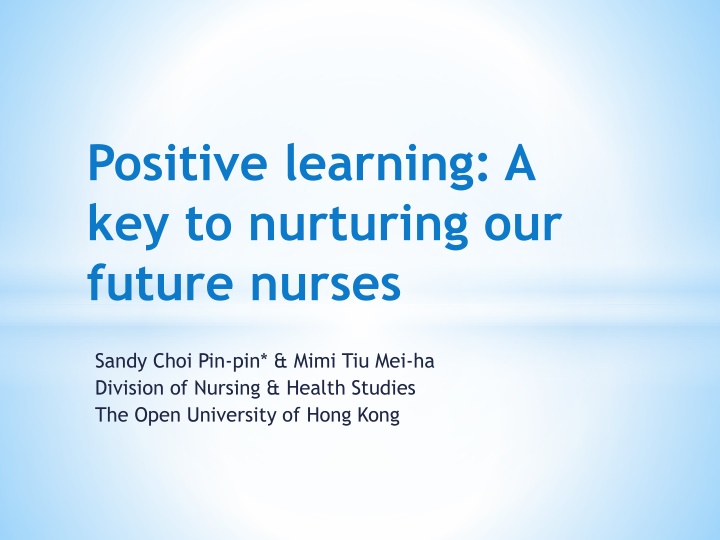
Nurturing Future Nurses' Learning Experiences: A Positive Approach
Explore how positive learning impacts the learning experiences of future nurses, as highlighted in a study conducted by Sandy Choi Pin-pin and Mimi Tiu Mei-ha. The literature review delves into the challenges faced by nursing students, such as stress, confusion, and fear of adversities. The study aims to describe the learning process and address the literature gap in understanding academic and clinical learning aspects among nursing students.
Download Presentation

Please find below an Image/Link to download the presentation.
The content on the website is provided AS IS for your information and personal use only. It may not be sold, licensed, or shared on other websites without obtaining consent from the author. If you encounter any issues during the download, it is possible that the publisher has removed the file from their server.
You are allowed to download the files provided on this website for personal or commercial use, subject to the condition that they are used lawfully. All files are the property of their respective owners.
The content on the website is provided AS IS for your information and personal use only. It may not be sold, licensed, or shared on other websites without obtaining consent from the author.
E N D
Presentation Transcript
Positive learning: A key to nurturing our future nurses Sandy Choi Pin-pin* & Mimi Tiu Mei-ha Division of Nursing & Health Studies The Open University of Hong Kong
Content 1. Introduction 2. Literature review 3. Study aims 4. Design and methods 5. Findings 6. Discussion 7. Implications 8. Conclusion 9. References 2
Literature review Definition of learning: Learning is a process of acquiring specific knowledge or skills through study, preaching, involvement, connectivity by series of observation and encountering. interactivity and (Porter & Stuart, 2010) Nursing students learn through: 1. Textbooks 2. Clinical practices 3. Interacting with teachers and/or nursing staff 4. Interacting with peers (Cheetham & Chivers, 2001) 4
Literature Review (Contd) Learning experiences of nursing students: 1. Stress Students are uncertain about their ability Students are worried about making mistakes and giving wrong information to patients that may threaten patients safety 2. Confusion (Sharif & Masoumi, 2005) Stemmed from the gap between theory and clinical practice Students encounter difficulties in integrating what they learnt from theories into clinical practice (Shin, 2000; Sharif & Masoumi, 2005) 5
Literature Review (Contd) 3. Fear of Adversities Students fear that challenging staff s practice would lead to unfavorable outcomes (e.g. fail in clinical performance evaluation) Students show an increased tendency to comply with inappropriate instructions without making clarifications with staff Some students weigh maintaining the interpersonal relationship with nursing staff more heavily than providing quality patient care (Levett-Jones & Lathalen, 2009) 6
Literature gap Majority of the previous studies adopted a quantitative approach to examine students learning experiences Lack of systematic research in the local context that focused on both the academic and clinical learning aspects of nursing students
The study Study aims: To describe the process involved in the learning of nursing students To identify factors influencing the learning experiences of nursing students Study design: A descriptive qualitative study
The study (Contd) Samples and sampling method: 12 full-time nursing students from one of the universities in Hong Kong were recruited through snowball sampling Characteristics of the samples: Gender: 8 females & 4 males Stream of study: 7 Mental & 5 General Health Care students Programme of study: 7 Bachelor & 5 Higher Diploma Programme students Year of study: 5 Year 2, 2 Year 3 & 5 Year 4 students
The study (Contd) Data collection Data were collected through face-to-face individual semi- structured interviews using open-ended questions Examples of interview questions: How do you view your experience of learning in the university/clinical context? From your perspectives, what can facilitate or impede your learning? Interview duration: About 45-90 minutes Data collection period: December 2014 to February 2015
The study (Contd) Ethical considerations: Ethical approval was sought from a university s Ethics Review Committee Informants were briefed about the study purpose and procedures Informants were assured of confidentiality and their right to withdraw from the study at anytime Written consent was sought from informants regarding their voluntary participation, and their agreement to have the interviews audio-recorded and interview findings processed for publication purpose
The study (Contd) Trustworthiness of the study: Person triangulation Investigator triangulation Peer debriefing Audit trail
Data analysis Identify important characteristics of the data and preliminary concepts through memoing generate codes to data Codes identified: e.g. insufficient opportunities, unclear expectations, lack of autonomy Re-examine each theme Assign an informative name to each theme Themes defined: e.g. Institutional learning, peer support Review the themes and the data again Defining and naming themes Familiarizing with the data Searching for themes Reviewing themes Coding Write Up Examine the codes and collate the data Identify significant broader patterns of meaning Broader patterns of meaning: e.g. Ward culture, course scheduling, learning resources Integrate the analytic narrative and data extracts Contextualize the analysis with reference to existing literature Read and re-read the transcriptions for several times 13
Findings *Learning process of nursing students *Factors contributing to positive learning experiences 14
Learning process Learning is a process of developing competence in order to meet the required standard of services and conduct of a professional nurse 15
Learning process Stage 1: Envisioning & Ideating Envision about the role and responsibilities of a nurse and ideate the (professional) image of nursing Such ideas are developed primarily through institutional learning Lectures on basic nursing knowledge and skills Simulation training The school has prepared us with the theoretical knowledge needed in managing patients situations. And the school has also taught us the procedures, like the aseptic technique for dressing, catheterization and giving injections, three-checks and five-rights for administering medications. I learned that nurses are responsible for these jobs... As for our role ..(eh) . our role would be to carry out nursing tasks according to the doctor s prescription, and be patients advocate at all times. (Student 10, Year 3) like . Simulation training . It provides us with opportunities to practice the nursing skills learnt before. Though we couldn t practice those skills on a real person, it gives us a more concrete impression, a preliminary understanding of that... Also, some emergency situations were simulated using computer programmes, therefore we could have some ideas on how to handle different situations. 16 (Student 1, Year 2)
Learning process Stage 2: Experiencing & Integrating Actualize the ideation of professional nursing previously formed through practical experience and learn to integrate the theoretical knowledge and skills into practice Clinical exposure is crucial. When I had my clinical placement, I had chances to apply what I learnt from school into real situations. I have a taste of what is it like of being a nurse (Student 3, Year 4) I don t expect that I would only be doing routine work in my fourth year of study . I haven t had much chance to carry out any advanced tasks in my practicum, and I find it difficult to integrate what I learnt from the school in the clinical practice. (Student 8, Year 4) 17
Learning process Stage 3: Reflecting & Realizing Engage in self-reflection and evaluate their own performance / competence level Realize what nursing means I realized that it involves more than caring for patients, but that you have to deal with the communication with different disciplines as well. And .you know . I am not sure if I am ready to be a nurse ..I can complete a task proficiently without any supervision but sometimes, I feel like I am still not prepared, and not qualified as a competent nurse. (Student 4, Year 4) We used to focus a lot on the procedures involved in the nursing tasks, whether we can refine any steps and carry out the procedures in a proficient manner, yet we rarely ask why we have to do so As we learn more, we reflect further on our performance... I would ask myself the reason behind and the meaning of the tasks. And I start to look for more knowledge related to a particular disease and its management. (Student 11, Year 4) 18
Six essential elements of positive learning Emotional support Informational support Availability of learning resources Role modeling Integrated learning activities Supportive ward culture Clinical level Institutional level Team level
Six essential elements of positive learning (Cont d) 1. Role modeling Nursing staff as a primary role model through: Sharing experiences and developing critical thinking Demonstrating the role and attitude of a professional nurse a) b) My mentor is experienced, and for every shift, she requires me to write nursing notes, she realized that the things I wrote is sometimes not up to standard, she would then teach and explain how to write that in a correct way... I learn from her on how to be a good and qualified nurse. (Student 12, Year 4) Nurses have their own ways to get rid of patients inappropriate behaviours, and the strategies that the nurse used, was like (wow), made me feel so inspiring, and I really wanna be like her! (Student 12, Year 4)
Six essential elements of positive learning (Cont d) 2. Supportive ward culture Affected by the attitude of nursing staff Whether students are welcomed and accepted as part of the team Some nurses would give us chances to practice for example, there was a patient who required chest tapping, she asked me to assist her in the procedure and let others take care of the basic routine stuff. (Student 8, Year 4) The ward culture as well as nurses attitude matter a lot. These determine whether you would have opportunities to practice your nursing skills in the practicum.. I once had a mentor who was really rude to students She didn t give me any chance to carry out any nursing tasks, and simply asked me to read patient notes in the ward . I didn t learn much from that practicum, and I am worried that I have already lagged behind others (Student 6, Year 3)
Six essential elements of positive learning (Cont d) 3) Availability of learning resources Concerning the adequacy and accessibility of learning resources (e.g. books and databases) There is a lack of resources in our school library, such as textbooks, reference books, databases... These affect our learning as well. (Student 1, Year 2) I learn a lot from a variety of resources... For example, the clinical guidelines and protocols placed in every ward, as well as the reference books in our library, and journal articles, I enjoy reading that as the knowledge disseminated is more up-to-date (Student 7, Year 2)
Six essential elements of positive learning (Cont d) 4. Provision of integrated learning activities Concerning course scheduling and how theoretical and clinical learning is integrated You will soon be allocated to clinical placement, but some of the things have not yet been taught like we have placement in a rehabilitation ward, but we haven t learnt anything about rehabilitation yet, all I can do was to remain silent when being questioned, I reckon if they can make some adjustment on such situation, it would reduce difficulties. (Student 11, Year 4) Some of the very experienced lecturers, would actually act to show us how the cases are like one of the senior staff, who was once a nursing officer, would do role-play or drama and share with us how to manage different psychiatric emergency situations, it s a very useful way to bridge the gap between theory and practice... (Student 6, Year 3)
Six essential elements of positive learning (Cont d) 5. Informational support from peers Study groups formed to share learning experiences Knowledge gained from peers helps to better prepare themselves for clinical placement In school, we share among ourselves our views and opinions about the courses and clinical placement During revision periods, or before examinations, we exchange ideas on how to study the courses, and prepare for examinations. (Student 1, Year 2) I am not the first student who is assigned to that ward, some classmates have been there before. I would ask them about what the ward nature is like there, so that I can better prepare myself before having placement there. (Student 7, Year 2)
Six essential elements of positive learning (Cont d) 6. Emotional support from peers Overcomes difficulties in clinical placement and institutional learning Facilitates psychological adjustment, and thus motivating students to learn and improve themselves During conversations, I would share with them my own stories, and they would talk about their experiences in clinical placement as well, like anything we have come across in the ward and things that make us sad Yes, I used to feel a lot more relieved and relaxed, and less stressful after listening to their comforting words... experiences, I turn to be more positive in viewing my own situation, and that motivates me to further advance myself as well . And sometimes, from their (Student 3, Year 4)
Discussion Previous studies focused on the factors that nursing students may encounter in the clinical placement as well as the negative aspects of their learning experiences (e.g. stress, confusion, reality shock, gap between theory and practice) This study uncovers the process of learning,and essential elements contributing to positive learning (Shin, 2000; Sharif & Masoumi, 2005; Shen & Spouse, 2007) Similar to previous literature, this study highlights frontline nurses as a role model that has a positive influence on: Students self-confidence, socialization, professional independence and clinical competence (Motlagh, Karimi & Hasanpour, 2012)
Discussion (Contd) Past studies also revealed that the ward culture/atmosphere has an impact on the learning experiences of nursing students In a supportive learning environment, students are valued and given opportunities to practice in order to meet their learning objectives Whether students feel that they are accepted, respected and valued by, connected with and integral to the ward, and that their professional and/or personal values are in harmony with those in the ward affect their clinical performance (Papp, Markkanen, & Von Bonsdorff, 2003; Levett-Jones & Lathlean, 2009)
Discussion (Contd) Institutional and peer support as another important sources of support for nursing students Institutional learning plays an essential role in laying the foundation for the development of clinical competence, as it shapes students understanding about the role and responsibilities of a nurse Mutual support among peers help students overcome the difficult situation alleviate stress undergo psychological adjustment consolidate their nursing knowledge (Bowden, 2008; Christian & Bell, 2011)
Implications for policy/practice/education 1. Mentorship schemes at both clinical and institutional levels - Between nurses and students - Between senior year and junior year students 2. Managerial efforts to build a positive environment conductive to learning and practice 3. On-going evaluation of educational programmes 4. Platforms for reinforcing team learning and mutual support
Implications for future research 1. A more systematic study with a larger sample size and more diverse samples from different institutions 2. A longitudinal study to examine how the learning experiences evolve over time, and their impact on the development of professional competence of nursing students
Conclusion This project describes the process of learning and factors influencing the learning experiences of nursing students Competence is developed through a learning process Positive learning is constituted by various factors at clinical, institutional and team levels, and concerted efforts are needed from different stakeholders in creating positive learning experiences for our future nurses
Acknowledgement Students involved in data collection and analysis: *Cheung Ming Wai Tania *Kwok Oi Tung *Leung Ching Yu *Tam Po Yee *Tang Kam Ho *Tse Man Ting *Tsui Pui Ling *Wai Nga Lun *Yeung Kwong Wai *Yu Pui Shan
Sandy Choi Pin-pin, PhD & RN Division of Nursing & Health Studies School of Science & Technology The Open University of Hong Kong Email: sppchoi@ouhk.edu.hk The END






















